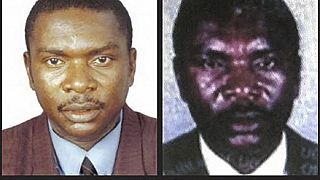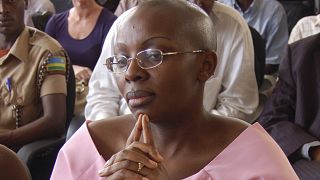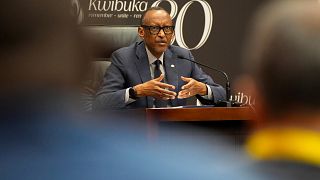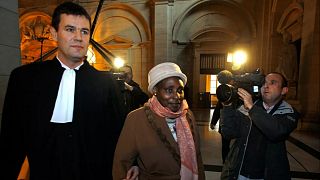Rwanda
Juliet Mukakabanda was hiding with her husband and three children in a small church in southern Rwanda when the family was lured to a nearby school by local leaders, who promised them "protection" from gangs of genocidal killers.
As a Hutu married to a Tutsi, Mukakabanda and her husband were prime targets for the Hutu extremists who unleashed a wave of terror across the country in April 1994.
One of the grimmest episodes in this nightmare unfolded in Gikongoro prefecture, where the family were sheltering.
There, they found themselves plunged into a bloodbath allegedly orchestrated by local leaders including prefect Laurent Bucyibaruta -- who goes on trial in France from Monday accused of genocide, complicity in genocide and complicity in crimes against humanity.
The terrified family had first fled to a local church in Gikongoro (since renamed Nyamagabe) after Hutu mobs torched the homes of Tutsi residents in their village.
They then decided to join throngs of people taking refuge in Murambi Technical School in Gikongoro, persuaded that the hilltop site was their best chance of escaping the militias roaming Rwanda with guns and machetes.
But it was a trap.
Just a few days later, at around 3 am on April 21, their supposed safe haven came under attack.
"We heard bullets being fired outside the school compound. The killers had guns, grenades, clubs, machetes and all sorts of killing weapons. My main worry was my children, I did not know how to protect them," Mukakabanda told AFP.
Mukakabanda, now 58, recounted her ordeal at the school site which has become one of Rwanda's main genocide memorials, where rows of black granite monuments bear the names of the dead and former classrooms house their skeletal remains.
'34 survivors'
As the killers besieged the school building, her husband and other men decided to go out and fight, leaving the women locked inside classrooms with their children.
"They were fighting with everything they could, including stones and sticks, but they were no match for bullets and grenades."
When the mobs broke down the door, Mukakabanda says she knelt to the ground, her one-month-old daughter cradled on her back, and started praying and pleading for mercy.
Seeing her Hutu identity card, the killers told her to stay outside as they stormed the building, going from room to room and massacring everyone inside, including her husband and two of her children.
According to accounts of the grisly events at Murambi, the local leaders had assured the Tutsi population they would be able to offer them better protection in a single location than if they were dispersed, and promised them food and water.
Instead, the authorities cut off the water supply to the school and deprived those inside of food, making it difficult for them to resist the attack.
Mukakabanda pointed the finger of blame at Bucyibaruta, who disputes the charges and any involvement in the killings, according to his lawyers.
"He is the one who ordered the police and security forces to find Tutsis who were hiding in churches and other places and gather them together in one area, under the pretext of providing them with protection," she said.
Mukakabanda and her baby were among just 34 people thought to have survived the Murambi slaughter that the Genocide Archive of Rwanda says claimed the lives of about 50,000 mainly Tutsis.
Her surviving daughter Pauline is now a 28-year-old mother of two, studying business administration in Kigali.
The widow herself is still living as a farmer in Nyamagabe, and is preparing to make the journey to Paris to testify at Bucyibaruta's trial.
'Never saw my parents again'
In the garden of the Murambi Genocide Memorial, Bucyibaruta's name is inscribed on a granite slab as No 1 on a list of 75 genocide suspects.
Inside, a black and white photo of a bespectacled Bucyibaruta is displayed alongside those of other local political, police and military figures accused of directing the 1994 bloodletting in the area.
Bucyibaruta is one of only a handful of Rwandans to go on trial in France over the genocide that saw an estimated 800,000 Tutsis and moderate Hutus perish in 100 days of slaughter.
Remy Kamugire, the Nyamagabe vice president of IBUKA, the umbrella association for genocide survivors, said he remembers Bucyibaruta as the leader who vowed to protect Tutsis only to turn on them.
Now 44, he said he was hiding out with his parents in the nearby parish of Cyanika to escape the marauding militias.
"Once the killers came, everyone tried to flee. I successfully ran away and hid but never saw my parents again. They were killed there that day."
Kamugire pointed out the building -- now a police station -- where the plan to exterminate those holed up in the school was allegedly drawn up at an April 19 meeting attended by Bucyibaruta and Rwanda's interim president Theodore Sindikubwabo, among others.
National Unity and Reconciliation Minister Jean Damascene Bizimana, guest of honor at Murambi's April 21 genocide commemoration ceremony, said he was pleased Bucyibaruta was finally going on trial.
"This is a case that has existed for more than 20 years, and seeing it finally getting a hearing before the criminal court is a welcome development," he told AFP.
"We hope justice will be done."











00:55
The Democratic Republic of Congo celebrates the centenary of Patrice Lumumba's birth
01:52
In Goma, solar power brings light and hope in Ndosho neighbourhood
02:13
Congo and Rwanda sign a US-mediated peace deal aimed at ending decades of bloody conflict
00:54
African Human Rights court says it can hear case brought by DRC against Rwanda
01:11
Burundi calls on United Nations to recognize 1972 genocide against Hutus
01:20
Somalia launches Centennial Vision 2060 roadmap for 'peace, prospertity and progress'